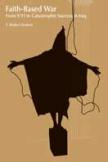Playing God
Despite all the experts, technology and intelligence available to the Bush administration, the war in Iraq, now going into its eighth year, was undertaken with “ardent devotion to a misplaced faith,” maintains T. Walter Herbert, emeritus professor of American literature and culture at Southwestern University in Georgetown, Tex. and author of this insightful new book. This faith was derived from a faith-filled narrative with roots in our Puritan heritage.
The Puritans saw themselves as God’s chosen people, to whom was given the Promised Land in America. The only thing stopping them from settling it were the savages who sought to kill them. The frontier hero emerged to rescue them from their plight.
This hero re-emerged in the 19th-century Wild West as the Indian fighter who saved the lives of hapless pioneers. Later, white-hatted good guys like Wyatt Earp also took on mythic proportions by bringing black-hatted outlaws to justice.
During the 1970s, the frontier hero becomes Clint Eastwood’s Dirty Harry, the blunt, cynical, unorthodox detective who overcomes his incompetent bosses to apprehend violent urban criminals.
President George Bush’s resolve to “get” the people responsible for the attacks on Sept. 11, 2001, also harkened back to the frontier hero, a role he played with moral certitude despite the poorly planned invasion and occupation, says Herbert. The president knew we could win in Iraq because we were doing the right thing. Besides, as a chosen people, America does not lose wars.
Meanwhile, Bush’s “phobic anger” about being right checked any advisers who expressed doubt in the mission. General Tommy Franks found that out before the war began when he questioned the number of troops needed.
“[E]xpressing unshakable faith…was the mark of a team player” in the Bush leadership ethic, Herbert writes. Likewise, any administration officials bearing bad news were silenced into “drinking the Kool Aid” of “religious delusion.”
By emphasizing his role as the war president and looking tough in the face of pressure and opposition, Bush attempted to allay any doubt that America was doing the right thing. Besides, Herbert wryly suggests, expressing doubt might have led to moral awareness, something that couldn’t be risked, especially when boots were on the ground.
The decision to go to war also involved its chief advocate, the Christian Right, the author points out, with its militarist religious vision seeking to avenge nonbelieving evildoers by executing God’s righteous wrath. The Muslim terrorists proved to be a good target on all counts.
While Herbert lays most of the blame for the war on President Bush, he criticizes the American people as well. Americans, he says, have learned to perceive war as an irresistible good not only because it has become the “center of value for the society” but because military power in the second half of the 20th century is seen as “the truest measure of national greatness.”
The most intriguing part of Faith-Based War is Herbert’s explanation of the Hooded Man of Abu Ghraib prison. This haunting symbol of the Iraq war stirred most Americans’ shock and shame to learn that we, who usually think of ourselves as the “good guys,” had not only used torture but justified its use.
One of President Bush’s first comments after 9/11 was the question: “Why do they hate us?” It played well with the American people because it evoked our feelings of innocent victimhood. Going to war against Iraq, however, moved us, as it did the Puritans, to a peculiar level of culpability because we tried to defeat the forces of evil by violating human law in the name of establishing God’s law.
After reading this acerbic account of the decision to go to war with Iraq, readers might wonder what will become of the frontier myth in the dangerous world of the 21st century. And Herbert might answer: distinguishing between reality and religious faith would be a good start.
This article also appeared in print, under the headline “Playing God,” in the March 15, 2010, issue.








